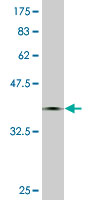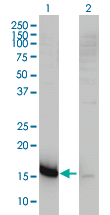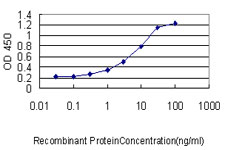CMTM5 Antibody (monoclonal) (M01)
Mouse monoclonal antibody raised against a full length recombinant CKLFSF5.
- SPECIFICATION
- CITATIONS
- PROTOCOLS
- BACKGROUND

Application
| WB, E |
|---|---|
| Primary Accession | Q96DZ9 |
| Other Accession | BC013109 |
| Reactivity | Human |
| Host | mouse |
| Clonality | Monoclonal |
| Isotype | IgG1 kappa |
| Clone Names | 2G1-6B10 |
| Calculated MW | 24653 Da |
| Gene ID | 116173 |
|---|---|
| Other Names | CKLF-like MARVEL transmembrane domain-containing protein 5, Chemokine-like factor superfamily member 5, CMTM5, CKLFSF5 |
| Target/Specificity | CKLFSF5 (AAH13109, 1 a.a. ~ 156 a.a) full-length recombinant protein with GST tag. MW of the GST tag alone is 26 KDa. |
| Dilution | WB~~1:500~1000 E~~N/A |
| Format | Clear, colorless solution in phosphate buffered saline, pH 7.2 . |
| Storage | Store at -20°C or lower. Aliquot to avoid repeated freezing and thawing. |
| Precautions | CMTM5 Antibody (monoclonal) (M01) is for research use only and not for use in diagnostic or therapeutic procedures. |

Thousands of laboratories across the world have published research that depended on the performance of antibodies from Abcepta to advance their research. Check out links to articles that cite our products in major peer-reviewed journals, organized by research category.
info@abcepta.com, and receive a free "I Love Antibodies" mug.
Provided below are standard protocols that you may find useful for product applications.
Background
This gene belongs to the chemokine-like factor gene superfamily. This family of genes encodes multi-pass membrane proteins that are similar to both the chemokine and the transmembrane 4 superfamilies of signaling molecules. Alternate transcriptional splice variants of this gene, encoding different isoforms, have been characterized.
References
CMTM5-v1, a four-transmembrane protein, presents a secreted form released via a vesicle-mediated secretory pathway. Li H, et al. BMB Rep, 2010 Mar. PMID 20356458.CMTM5 induces apoptosis of pancreatic cancer cells and has synergistic effects with TNF-alpha. Guo X, et al. Biochem Biophys Res Commun, 2009 Sep 11. PMID 19577543.CMTM5-v1 induces apoptosis in cervical carcinoma cells. Shao L, et al. Biochem Biophys Res Commun, 2009 Feb 20. PMID 19124004.CMTM5 exhibits tumor suppressor activities and is frequently silenced by methylation in carcinoma cell lines. Shao L, et al. Clin Cancer Res, 2007 Oct 1. PMID 17908965.The status, quality, and expansion of the NIH full-length cDNA project: the Mammalian Gene Collection (MGC). Gerhard DS, et al. Genome Res, 2004 Oct. PMID 15489334.
If you have used an Abcepta product and would like to share how it has performed, please click on the "Submit Review" button and provide the requested information. Our staff will examine and post your review and contact you if needed.
If you have any additional inquiries please email technical services at tech@abcepta.com.













 Foundational characteristics of cancer include proliferation, angiogenesis, migration, evasion of apoptosis, and cellular immortality. Find key markers for these cellular processes and antibodies to detect them.
Foundational characteristics of cancer include proliferation, angiogenesis, migration, evasion of apoptosis, and cellular immortality. Find key markers for these cellular processes and antibodies to detect them. The SUMOplot™ Analysis Program predicts and scores sumoylation sites in your protein. SUMOylation is a post-translational modification involved in various cellular processes, such as nuclear-cytosolic transport, transcriptional regulation, apoptosis, protein stability, response to stress, and progression through the cell cycle.
The SUMOplot™ Analysis Program predicts and scores sumoylation sites in your protein. SUMOylation is a post-translational modification involved in various cellular processes, such as nuclear-cytosolic transport, transcriptional regulation, apoptosis, protein stability, response to stress, and progression through the cell cycle. The Autophagy Receptor Motif Plotter predicts and scores autophagy receptor binding sites in your protein. Identifying proteins connected to this pathway is critical to understanding the role of autophagy in physiological as well as pathological processes such as development, differentiation, neurodegenerative diseases, stress, infection, and cancer.
The Autophagy Receptor Motif Plotter predicts and scores autophagy receptor binding sites in your protein. Identifying proteins connected to this pathway is critical to understanding the role of autophagy in physiological as well as pathological processes such as development, differentiation, neurodegenerative diseases, stress, infection, and cancer.




